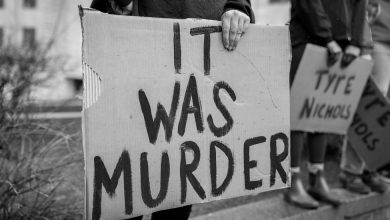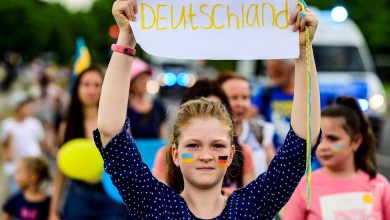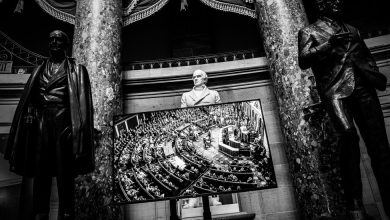This War Is Not in My Name

I felt sick when I read about Vladimir Putin announcing the start of a “special military operation” in Ukraine.
Images of bloodied civilians and bombed-out residential buildings flood my phone and TV. I still feel shaky. And angry.
It hit me, physically, how Mr. Putin abuses my language. Steals it to pretend he is defending the rights of Russian speakers. Russian is my mother tongue. It is the language I speak with my children. And I do not want it to be the language of war. Unfortunately, that is what it has become.
These words will offer no comfort for those under fire in Ukraine — but the least Russian citizens like me can do is not remain silent, even from afar. I only regret not speaking up when it all began in 2014.
It has been a long eight years since Russia annexed Crimea and Russian-backed separatists started a war in the Donbas region. Now, the 1.5 million people who fled from there to more peaceful areas of Ukraine are again at risk of losing their lives and their homes. It feels as if all hope for peace is gone.
I know many Ukrainians who are ready to fight and defend their freedom. “What is going on now, it is very scary, but Ukrainians will fight for independence until victory,” one wrote to me. Another said, “It is the last chance to stop the dictator.” They’re saying it all over social media, too. Those who can are joining the army. Others are building shelters, offering first aid and food. Ukrainians abroad are posting on social media, calling for sanctions and air support, and fund-raising for humanitarian efforts.
But I can’t see anyone eager to be on the frontline for the opposite side. Maybe it’s because the term “brotherly” nation, which the Kremlin has abused for years, means something real to Russians with parents, siblings and friends on the other side of the border.
Or maybe it’s because of the fear and sadness over what comes next — fewer freedoms and more pain. My elderly parents in Russia are stocking up on essentials like flour and rice. They’ve lived through several economic crises and seen the consequences of prior rounds of sanctions. People are lining up at banks to take out their cash, fearful that the ruble will crash. The war will almost certainly hit the economy, deepening already extreme inequality in a country where the average government pension last January was less than $200 a month.
I’ve gotten messages from fellow Russians saying not to worry, this war is “politics between Russia and the West and might end soon.” Or that the news is “tiring,” especially since the West “has its own propaganda.” Others have suggested that this war was the only option, given that Russians have been dying in the Donbas region for eight years — echoing a billboard in St. Petersburg showing a photo of Putin with the words “they left us no option.” It’s not that all of these Russians are necessarily big supporters of Mr. Putin. Many are simply exhausted, scared or have been subjected to a steady stream of propaganda.
So yes, we can see how the Russian language is the language of war. Mr. Putin made it so.
Russian has also become the language of a lie. Mr. Putin claims Russia is defending “traditional values,” but that is false. What kind of values are being defended by traumatizing tens of thousands of Ukrainian children and families? Forcing them to hide from bombs in the subway? For many, fleeing the war zone is not an option.
Is Putin’s rabid desire to redraw the map of Russia and recreate an empire meant to give them comfort? The so-called history he cites to justify this aggression is riddled with lies.
The line between facts and disinformation has been blurred in Russia for a long time. My family and I are not alone in remembering the horrors of the past century that were carried out in the name of the Soviet Union. The Kremlin has denied key facts around Holodomor, the famine that claimed the lives of millions of Ukrainians. It has whitewashed massacres in Chechnya and the Beslan school attack. Yet we have not forgotten. And we see what has been happening in recent years — political persecutions, expanding repression. Silencing dissent, shuttering Memorial, Russia’s most prominent human rights organization. Step by step, we have seen the denial and attempted erasure of historical truth.
Russian has become the language of fear. My parents avoid discussing politics over the phone; they’re not alone. Since the Kremlin has strangled freedom of speech, most Russians I know are afraid to publicly express their opinions. They’ve gone back to Soviet-era’ kitchen conversations to share their views on politics.
We have seen the Kremlin crack down violently on protests about elections and political prisoners like Aleksei A. Navalny. On the day Putin launched his full-scale assault on Ukraine, the government issued a statement warning that Russians who protest could face prosecution.
I was heartened, and scared, to see that the warning did not stop Russians from turning out in force that same day. Protests took place across Russia, from Moscow to St. Petersburg to Khabarovsk. Signs bore messages like “No War” and “Do you see evil and keep silent? Partner in crime!” Nearly 1,800 people were arrested.
And it’s not just that: Some Russian journalists have openly condemned the invasion of Ukraine. Russian celebrities, too. Tennis star Andrey Rublev used a marker to write “no war please” on a camera lens at an international tournament, while the actress Katerina Shpitsa wrote that for the first time in her life she “thought it might be better” that her grandmother wasn’t alive to see this day.
This is nearly unprecedented.
They all know that their words will not stop the war machine. But as Yury Dud, one of the most popular independent journalists in Russia, said, at least their children will know they did not support this government’s “imperial frenzy.” They use our language for peace, not war.
I left Russia in 2014, and it has taken me years to learn how to breathe and speak freely. I still get goose bumps when I have to show my passport at Russian border control.
It will be even scarier after I’ve written this. But I have to say it: Russian should not be a language of war. This war is not in my name.
Irina Kuznetsova (@IrinaKuzn) emigrated from Russia to Britain in 2014. She is an associate professor of human geography at the University of Birmingham.
The Times is committed to publishing a diversity of letters to the editor. We’d like to hear what you think about this or any of our articles. Here are some tips. And here’s our email: [email protected].
Follow The New York Times Opinion section on Facebook, Twitter (@NYTopinion) and Instagram.





